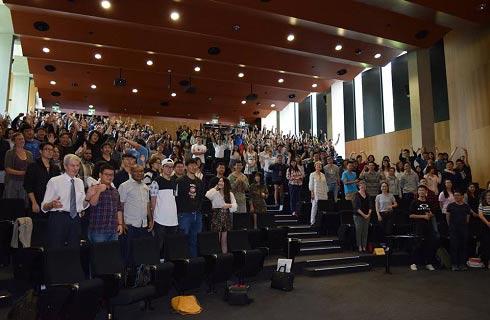日本研究文学学士(荣誉)学位(国外授课)
BA (Hons) Japanese Studies (with Year Abroad)

学历文凭
Bachelor Degree with Honours

专业院系
Interdepartmental

开学时间

课程时长

课程学费

国际学生入学条件
IDP—雅思考试联合主办方

雅思考试总分
6.5
- 雅思总分:6.5
- 托福网考总分:80
- 托福笔试总分:
- 其他语言考试:Pearson Academic PTE - 62 (with no less than 59 in each Communicative Skill) Cambridge C2 Proficiency or C1 Advanced - 176 with a minimum of 169 per component
CRICOS代码: T202
申请截止日期: 请与IDP联系 以获取详细信息。
课程简介
Immerse yourself in Japanese language and culture. Develop your Japanese language skills and spend a year in Japan.,This multidisciplinary degree will develop advanced knowledge and the understanding of Japanese language and culture. You will study a core language module in each of your three years. You don’t need to have any previous knowledge of Japanese, but a pathway is available if you already have an A level or equivalent qualification in Japanese. You will spend your third year studying the Japanese language at a university in Japan. This is an amazing opportunity to experience Japanese culture first-hand and to put your language skills into practice and context. You can also apply to add a placement year to your degree, increasing the course from four years to five. In your final year, you will bring together all your learning and experience to write a dissertation on an aspect of Japanese studies. Read more about our teaching and the year abroad, and hear from our students here You will study a core language module in each of your three years. You will also have the chance to choose from a selection of other modules relevant to the study of Japan from other departments. This includes Anthropology, Education, Government and International Affairs, Economics, and Theology and Religious Studies. In addition, you may choose to take additional language modules, including European languages, Chinese and Korean.Course structureYear 1 modulesCore modules:Japanese Language 1A (for post-A level entrants). This module will consolidate and extend your grammatical knowledge, to enhance your communication skills in written and oral Japanese.Japanese Language 1B which will provide an introduction to all aspects of the Japanese language. You will get a thorough grounding in the major grammatical features of Modern Japanese, build up your vocabulary and develop skills in reading, writing, listening and speaking.Introduction to Japanese Culture: From Antiquity to the Present will introduce you to the cultural history of Japan and its philosophy, art and literature. It will help foster a consciousness of Japan's role in and experience of globalisation over the long term. You will also learn about critical concepts and methodologies for the analysis of textual and visual artefacts.Imagining East Asia in the Modern World covers cultural, social and political history of modern East Asia and the lives and experiences of different people living in and migrating to and from East Asia during the past five centuries.Optional modules:In recent years, optional modules have included: People and CulturesIntroduction to Chinese CultureFrench LanguageGerman LanguageItalian LanguageRussian LanguageInternational Security, Interdependence and OrganisationGlobal Regions in International RelationsSpanish LanguageWorldview, Faith and IdentityGallery 101: Designing an Art Exhibition Year 2 modulesCore modules:Japanese Language 2A. This module will further your knowledge of the Japanese language, including grammar and lexis. It will enhance your communicative proficiency in Japanese, in both writing and oral presentation and interaction, and further develop your listening and reading skills. You will also broaden your knowledge of traditional and contemporary Japan, and develop your intercultural awareness.Japanese Language 2B. This module will further develop your linguistic skills across the full range of reading, writing, listening and speaking. It will also prepare you for living abroad in terms of language, practical knowledge and cultural competence.
相关申请
 预科
预科 奖学金
奖学金 实习机会
实习机会 在校学习
在校学习 跨境学习
跨境学习 校园授课-线上开始
校园授课-线上开始 在线/远程学习
在线/远程学习
开学时间&学费
学费信息仅供参考,请与IDP联系以获取详细信息
| 开学时间 | 时长 | 学费 | 地点 |
|---|
学校排名

世界排名114
数据源:
泰晤士高等教育世界大学排名
关于杜伦大学

杜伦大学创建于1832年,是英国历史最悠久的大学之一。杜伦大学建于中世纪世界遗产地旁,有着悠久的历史和现代价值观,是一座备受推崇并拥有前瞻性思维的学府。如今,来自世界各地的18000多名学生在达勒姆就读。杜伦大学有28个系,开设有200多门本科和研究生课程。该校很多教师都处于各自领域的最前沿。教职人员利用出色的研究和学科知识为所有学生提供优质的教学。目前,杜伦大学有17个学科在全球大学中名列前100位,其中九个学科名列前50位。除了在学术上的卓越成就,该校还努力为学生提供支持,帮助他们在毕业后获得有意义的工作。其毕业生就业能力目前在世界上排名第88位。该校的就业与创业中心致力于培养学生的专业技能,并提供商业人脉和工作机会。杜伦大学目前在2020年《QS世界大学排名》中名列第78位,稳稳跻身全球大学百强之列。该校为教职人员和学生创造了一个热情友好的多元化社交环境,并因此而倍感自豪。目前,杜伦大学28%的在校生为非英国本土学生。大学社区处在独一无二的达勒姆求学体验的核心位置,达勒姆的每个社区均是多元化、多学科的社区,由来自不同背景和文化的学者、学生和工作人员组成。有了这些社区,加上该校杰出的支持体系,学生们一定会有宾至如归之感,并可参与大量精彩的课题。
本校相关课程

博士神学与宗教
学历文凭
Ph.D.
开学日期
课程费用总额


MLitt神学与宗教
学历文凭
Masters Degree (Taught)
开学日期
课程费用总额


博士学位论文博士学位
学历文凭
Ph.D.
开学日期
课程费用总额


理学硕士心理学研究
学历文凭
Masters Degree (Research)
开学日期
课程费用总额


研究心理学硕士
学历文凭
Masters Degree (Research)
开学日期
课程费用总额


博士哲学
学历文凭
Ph.D.
开学日期
课程费用总额

其他相关课程

中学11年级和12年级
 马特·克里斯蒂学院
马特·克里斯蒂学院学历文凭
Secondary School
开学日期
课程费用总额


应用语言学硕士-应用语言学
 昆士兰大学
昆士兰大学泰晤士高等教育世界大学排名:80
学历文凭
Masters Degree (Coursework)
开学日期
课程费用总额


国际研究学士-中文
 昆士兰大学
昆士兰大学泰晤士高等教育世界大学排名:80
学历文凭
Bachelor Degree
开学日期
课程费用总额


脑与精神科学研究生文凭
 悉尼大学
悉尼大学泰晤士高等教育世界大学排名:54
学历文凭
Graduate Diploma
开学日期
课程费用总额


脑与精神科学研究生证书
 悉尼大学
悉尼大学泰晤士高等教育世界大学排名:54
学历文凭
Graduate Certificate
开学日期
课程费用总额


脑与精神科学硕士
 悉尼大学
悉尼大学泰晤士高等教育世界大学排名:54
学历文凭
Masters Degree (Coursework)
开学日期
课程费用总额










 英国
英国